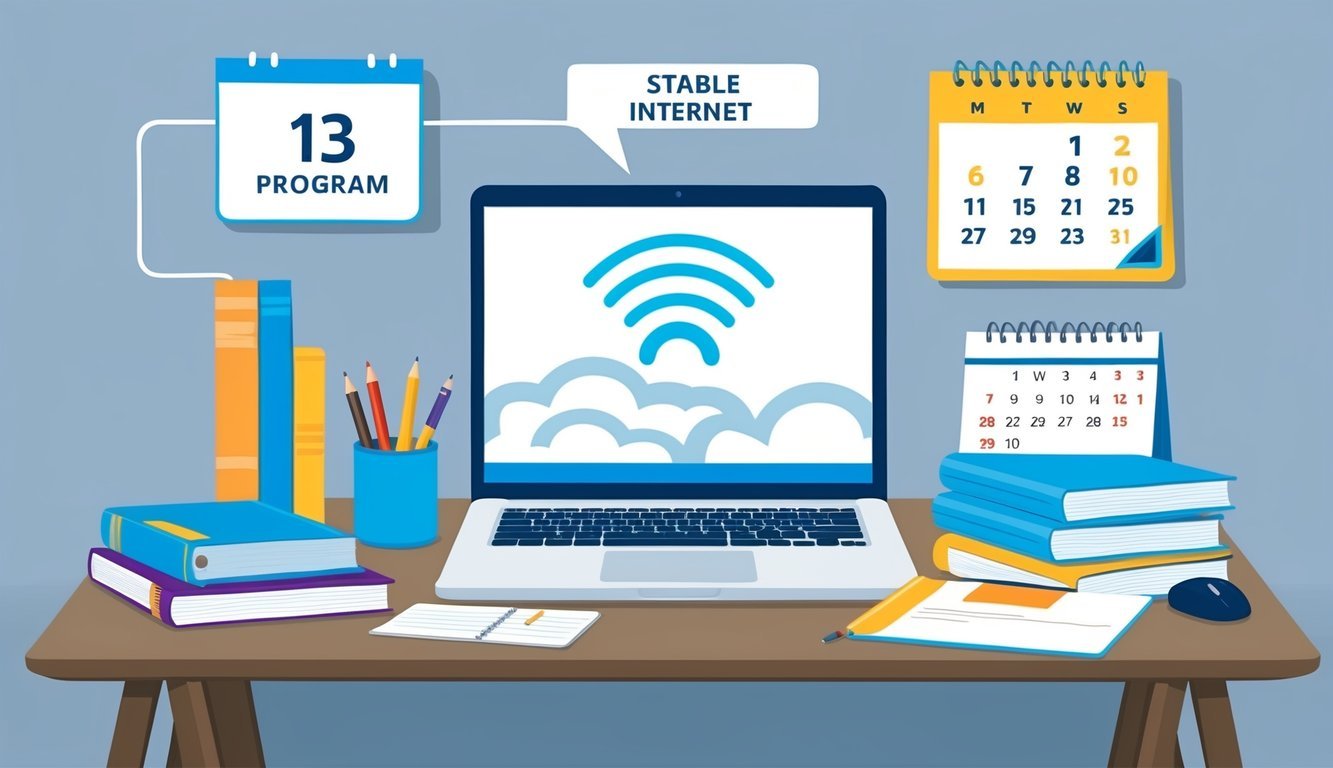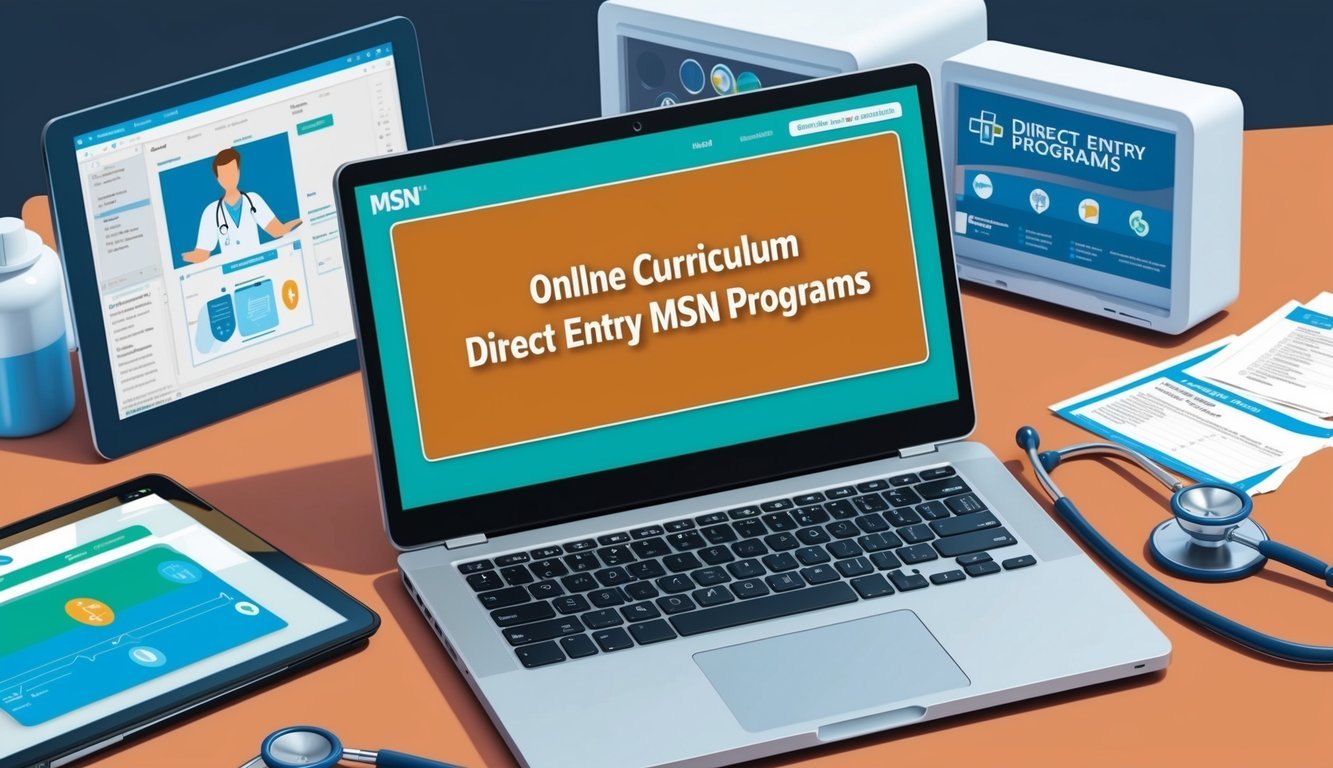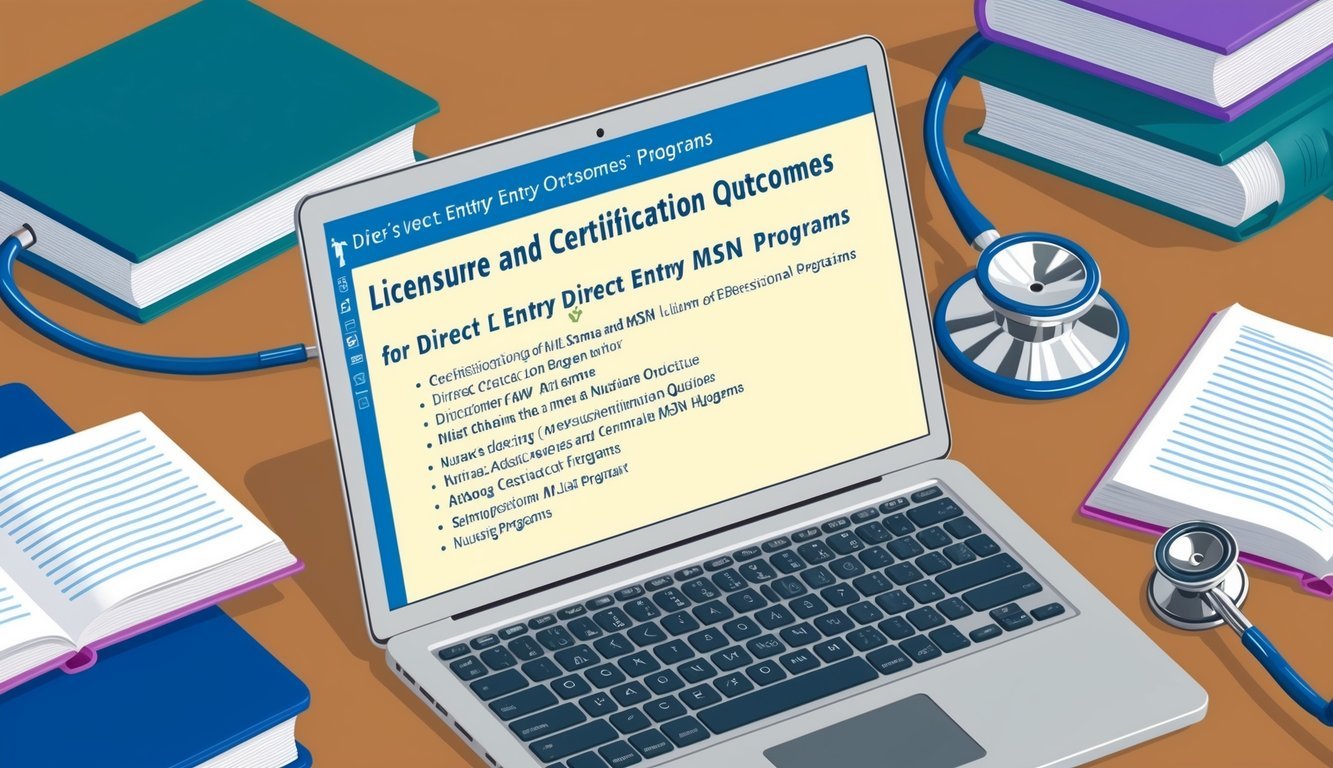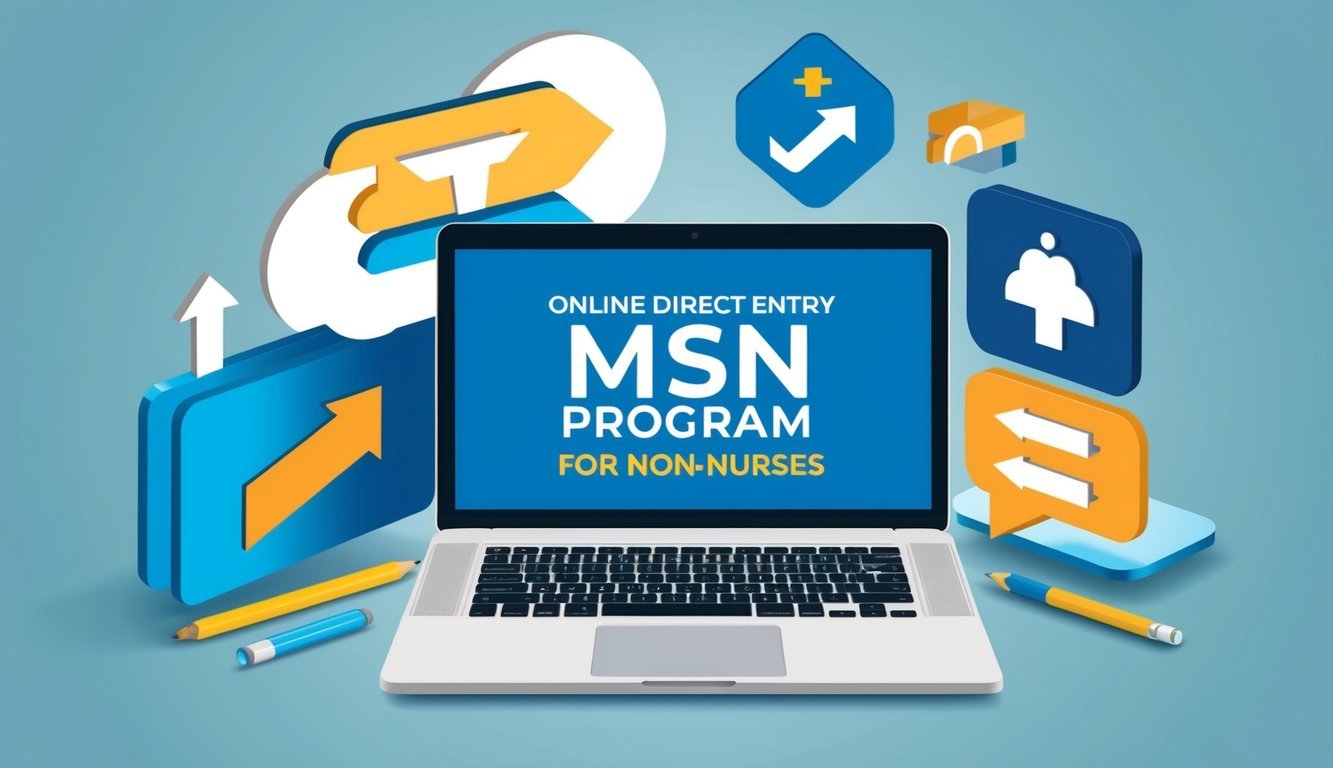Direct entry MSN programs for non-nurses online offer an accessible path to a rewarding nursing career.
These programs enable individuals with non-nursing bachelor’s degrees to transition into nursing roles.
They often take 20 months to a few years.
With the growing demand for healthcare professionals, pursuing a Master of Science in Nursing (MSN) has never been more timely or beneficial.
Many online programs are designed to accommodate your schedule.
This allows you to complete both classroom and clinical components from the comfort of your home.
Institutions like Elmhurst University and Marquette University provide well-structured curricula.
These prepare you for the NCLEX-RN and Clinical Nurse Leader (CNL) exams.
This flexibility means you can work towards your new career while balancing other obligations.
As you consider the available options, you will find a range of programs that cater to different needs and timelines.
The accelerated nature of direct entry MSN programs ensures that you can gain the skills and qualifications necessary to excel in a nursing career without prolonged delays.
Exploring the best programs will guide you to the right choice for your future in nursing.
Understanding Direct Entry MSN Programs for Non-Nurses
Direct entry MSN programs provide an efficient route for non-nurses to transition into the nursing profession.
These programs offer a pathway to earn a Master of Science in Nursing (MSN) through a combination of online coursework and clinical experiences.
Overview of Direct Entry MSN Programs
Direct entry MSN programs are designed specifically for individuals holding a non-nursing bachelor’s degree.
These programs typically include a comprehensive curriculum that covers essential nursing concepts and skills.
You can expect courses in advanced nursing practice, healthcare systems, and patient care management, along with clinical training.
Most programs require students to complete approximately 60-80 credits.
The coursework varies, but many programs integrate theoretical knowledge with hands-on experiences.
You will find that some institutions offer accelerated options to complete the program quicker.
These options often take as little as 20 months, allowing you to enter the workforce sooner.
Transition into Nursing for Non-Nurses
Transitioning into nursing from a non-nursing background can be an exciting journey.
Direct entry MSN programs facilitate this change by providing foundational nursing education tailored for those new to the field.
You will learn about patient care, ethics, and nursing methodologies through a structured curriculum.
In addition to classroom learning, clinical placements allow you to gain practical experience in various healthcare settings.
Many programs also include mentorship opportunities to support your transition.
Engaging with experienced nurses can enhance your understanding of the profession and help you develop the necessary skills.
Online Format and Hybrid Options
Many direct entry MSN programs are now available in online formats, making them accessible to a broader audience.
Online direct-entry MSN programs offer flexibility, allowing you to balance studies with personal and professional commitments.
Some programs adopt a hybrid format, combining online coursework with on-campus clinical experiences.
This approach enables you to benefit from both the convenience of online learning and the hands-on training required for nursing.
When considering an online or hybrid program, review the specifics of each option.
Tuition costs, clinical hours, and program length can vary widely, influencing your overall educational experience.
Direct entry MSN programs are designed to be comprehensive, ensuring you graduate prepared for the nursing workforce.
Program Requirements and Prerequisites

In pursuing a Direct Entry MSN program, you must understand the specific admission requirements and prerequisite coursework needed for successful entry.
These elements are essential for preparing you for advanced nursing education.
Admission Requirements
Admission to Direct Entry MSN programs typically involves a few key criteria.
Most institutions require you to hold a bachelor’s degree in a non-nursing field.
Common admission requirements include:
- GPA: A minimum cumulative GPA, often around 3.0.
- Transcripts: Official transcripts from all post-secondary institutions attended.
- Letters of Recommendation: Usually two to three letters from professional or academic references.
- Personal Statement: An essay outlining your motivations and goals in pursuing nursing.
- Test Scores: Some programs may require GRE or MAT scores, though many have waived this requirement.
Always check the specific requirements of the program you’re interested in, as they can vary.
Prerequisite Coursework
Before admission, you must complete certain prerequisite courses to ensure you are well-prepared for the nursing curriculum.
These courses usually include:
| Subject | Description |
|---|---|
| Anatomy | Understanding human body structure. |
| Physiology | Study of body functions. |
| Biology | Fundamental concepts in life sciences. |
| Chemistry | Basic chemistry principles relevant to health sciences. |
| Microbiology | Study of microorganisms and their effects on health. |
| Nutrition | Basics of human nutrition and diet. |
| Psychology | Understanding human behavior and mental processes. |
| Sociology | Insights into social behaviors and structures. |
It’s essential to complete these courses with a satisfactory grade, often a C+ or higher.
Always verify course requirements with your chosen program, as some may have additional specific prerequisites.
Curriculum and Clinical Experience

In pursuing a Direct Entry MSN program, you will encounter a comprehensive curriculum that combines essential nursing core courses with clinical experience.
This dual focus ensures that you gain both theoretical knowledge and practical skills necessary for a successful nursing career.
Nursing Core Courses and Specializations
The nursing core curriculum typically includes foundational courses such as nursing theory, population health, and evidence-based practice.
Core courses equip you with critical thinking skills and a solid understanding of patient care principles.
You may also have opportunities to specialize in various nursing areas.
For instance, you could choose tracks like Family Nurse Practitioner (FNP), Psychiatric Mental Health Nurse Practitioner, or Pediatric Nurse Practitioner.
These specializations often require additional coursework tailored to meet the needs of specific populations, enhancing your competency in diverse clinical settings.
Clinical Rotations and Simulation
Clinical rotations are a crucial part of your training, providing hands-on experience in real-world healthcare environments.
These rotations usually consist of a predetermined number of clinical hours across different specialties, allowing you to apply what you’ve learned in the classroom.
Simulation centers play a significant role in this training.
They allow you to practice clinical skills in a controlled environment that mimics real patient scenarios.
This experience is vital for developing your clinical judgment and technical skills before entering actual clinical placements.
Alongside your clinical training, you will engage with experienced nursing professionals.
This will enhance your patient care experience and ensure you are well-prepared for your future role in nursing.
Licensure and Certification Outcomes

Completing a Direct Entry MSN program positions you to pursue essential licensure and certification, enabling you to practice as a registered nurse and potentially advance your career.
Understanding the requirements and outcomes associated with these processes is crucial for your professional path.
NCLEX-RN Examination
After obtaining your MSN, the next step is to secure your RN licensure by passing the NCLEX-RN examination.
This is a standardized test designed to assess your knowledge and skills necessary for safe and effective nursing practice.
Preparing for the NCLEX-RN can include various resources and techniques:
- Study Guides: Invest in comprehensive NCLEX-RN prep books.
- Practice Tests: Utilize online platforms for simulated exams.
- Review Courses: Consider registration in NCLEX review courses.
The national NCLEX-RN pass rate has fluctuated, but it typically hovers around 80%.
Familiarizing yourself with the exam format and content can significantly increase your chances of success.
For more information on preparation, visit NCSBN.
Advanced Nursing Certifications
Beyond RN licensure, you may pursue advanced nursing certifications to enhance your qualifications.
Specializations can lead to roles such as Clinical Nurse Leader (CNL), Nurse Practitioner (NP), or Clinical Nurse Specialist (CNS).
Each certification requires specific educational and clinical practice standards.
Common certifications include:
- CNL Certification: Focused on improving healthcare delivery.
- NP Certifications: Various concentrations, including family, pediatric, and mental health.
- CNS Certification: Concentrated on a specialized area of nursing practice.
Certification not only broadens your career opportunities but may also lead to higher salaries and improved job security.
Fees and exam requirements vary, so check the respective certifying bodies for details on eligibility and tuition costs associated with certification programs.
For further details on advanced certifications, refer to ANCC.
Career Pathways and Advancement

Pursuing a Direct Entry MSN program opens various avenues for your career in nursing.
This educational path allows you to transition into roles that offer significant influence within healthcare systems, along with competitive salaries and diverse specialties.
Nursing Roles and Specialties
As a graduate of a Direct Entry MSN program, you will be equipped for several advanced roles.
Common pathways include:
-
Nurse Practitioner (NP): Focus on patient care in primary or specialized settings. NPs often have autonomy and higher earning potential.
-
Clinical Nurse Leader (CNL): Leading patient care teams, implementing evidence-based practices, and enhancing care quality.
-
Nurse Educator: Teaching future nurses and shaping curricula in academic settings, an essential role in maintaining nursing standards.
-
Nurse Leader: Taking on management responsibilities, you will influence healthcare policies and practices.
These roles often come with a higher salary potential compared to entry-level nursing positions.
Advanced practice registered nurses can earn significantly more, with salaries varying widely based on specialty.
Employment Opportunities
The employment landscape for MSN graduates is promising.
Here are some opportunities available:
-
Healthcare Systems: You can find positions within hospitals, outpatient clinics, and community health organizations.
-
Academic Institutions: Many educators need in nursing schools, reflecting the growing demand for well-trained nurses.
-
Nursing Leadership Positions: These roles include management and administrative positions, influencing nursing practice and policies.
-
Research Roles: You can contribute to nursing research to enhance practices and improve patient outcomes.
In this evolving field, having an MSN gives you a competitive edge.
Various sources, including Nurse.org, note that the demand for qualified nurses is at an all-time high.

